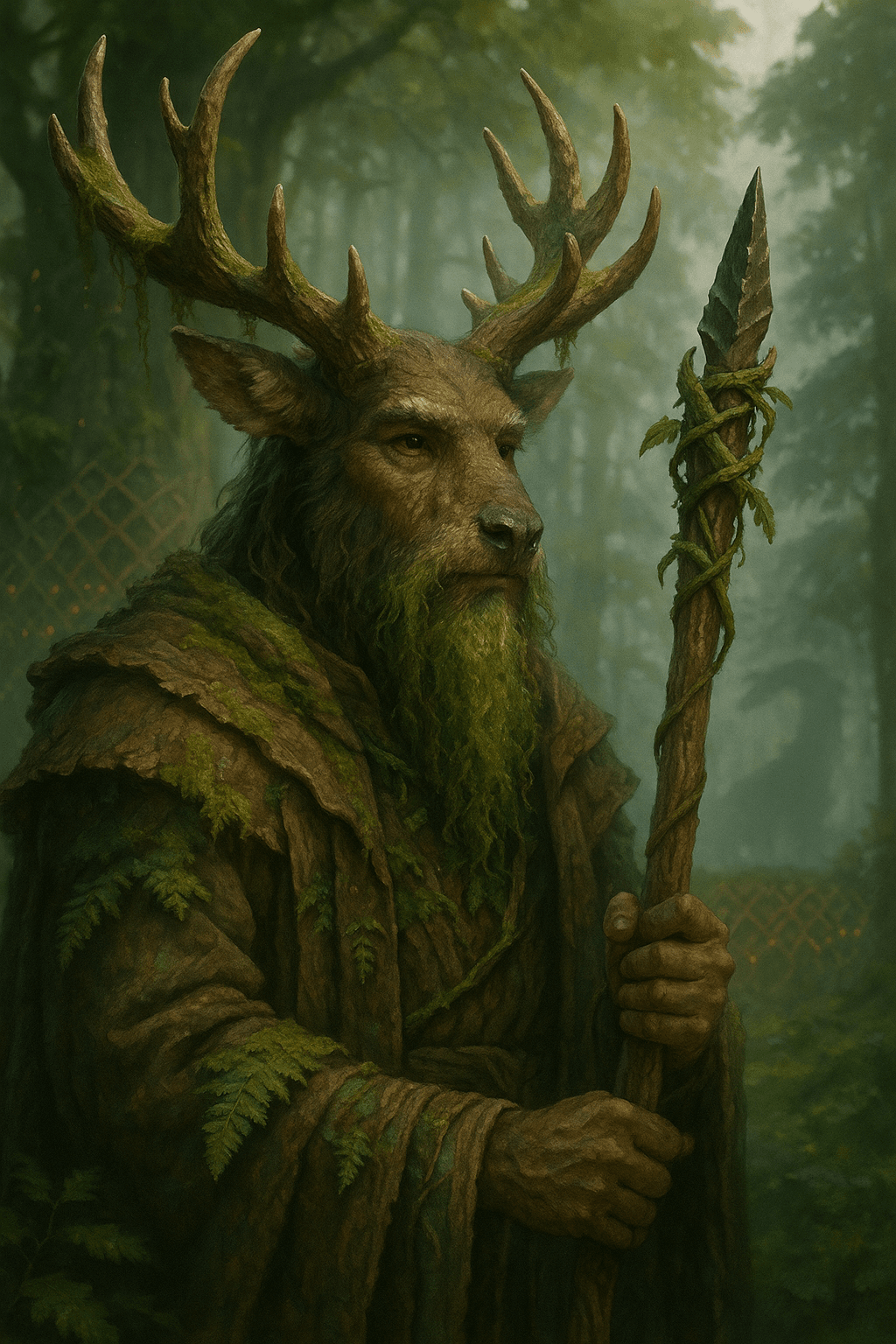Archdruid Fen Mossbark
Hold steady where root meets storm.

They say an archdruid’s first duty is to listen until the forest teaches you what the question truly is. Fen Mossbark learned that lesson kneeling in damp leaf-mold long before anyone called him Archdruid. Elk-horned and even-tempered, he carried his power the way an old tree carries snow—without flourish, mindful of weight and balance. When the Verdant Circle ripened from a camp of spirit-speakers into a nation’s conscience, it was Fen whom the elders trusted to keep Galdrowen from mistaking strength for noise.
Ascendance.
In those burgeoning years Fen Mossbark took up the mantle beneath Thornhall’s living council-tree and set about turning intuition into practice. Border paths were rewoven so patrols moved like sap: out from the heart, back to the heart, never lost. He codified the Circle’s “root-oaths,” insisting that promises be spoken to living wood so the land itself could keep witness. Thornspine broods, once scattered guardians of happenstance, became disciplined ward-flights under his direction; quill quilts hummed along the edges of the forest, a visible reminder that Galdrowen defended with life, not stone.
Fen favored accord over spectacle. He brokered exchanges with Skyreach’s early Luminari—root-lore traded for clean star-charts and restrained experiments near ley glades. He kept polite distance from Itharûn’s proud dragonriders yet sent envoys to share wildfire protocols when their training fields edged close to tinder-dry groves. With Duskfall Mire the work was harder. Resource skirmishes flared where herbs and rare woods overlapped. Fen walked those contested swales in person, antlers wreathed with fernlight, and drew sleeping lines in the mud with his staff. “Grow on your side, we on ours,” he told Vinebound emissaries who smiled like knives. It held for a season. Sometimes the world only gives you a season.
What defined Fen’s Ascendance was neither treaty nor victory, but calibration. He sponsored Kara Windshade’s careful studies of Thornspine venom—demanding that every new use for harm be balanced with a use for healing. He encouraged Rootcaller Brannok to train guardians who could lift a fallen oak without breaking a snail-shell. He kept a private ledger of gifts received from spirits and the gifts returned, a book of debt that reminded him power was borrowed, never owned. When the Grove-Wyrms stirred, Fen greeted them bare-headed and unafraid, accepting their watchful presence as both blessing and burden. “We keep the leys as a gardener keeps water,” he told his wardens. “Guided, never dammed.”
Fracture.
Then the world tore. Leylines snarled, seasons stumbled, and parts of the forest woke wrong. The Shattering unstitched the quiet agreements Fen had woven through years of patience. Thornspine flights grew hair-trigger; their quills sang in minor keys that set teeth on edge. Duskfall’s Whispering Bloom tasted opportunity in the chaos. From Hollowroot came sly forays—vine-crests after ley shards, whisper-thieves bending memories near the border. Fen had to make decisions faster than a tree’s wisdom prefers.
He split the Circle’s response into three living branches. First: containment. Wards were redrawn around corrupted glades, not as prisons but as poultices—layers of resin lattice and spirit-song meant to keep the sickness from spreading. Second: reconciliation. Nuala of the Grove walked the dreamroads, seeking counsel from Grove-Wyrms whose long sleep remembered calmer harmonies. Third: resistance. Brannok led mixed teams of wardens and Thornspines to intercept Mire incursions, their movements timed to the erratic pulse of the fractured leys. Fen stood at each crossing of those branches, measuring cost.
The weight marked him. The elk in him wanted to charge; the elder in him refused to squander what could be saved. Some in the Circle argued for fire-cleansing of blighted groves. Fen listened, then shook his moss-hung crown. “We do not amputate where we can knit,” he said, though the knitting drew sap and years from him. When Thar Zûl’s heat flared at the world’s edge, he redirected strength to the fissures nearest those ash-winds, knowing Galdrowen could not fight every war and remain itself.
Rivalry sharpened necessity. Mistcaller Nyvra of the Whispering Bloom played the long shadow, reaching with charm and threat to claim what the chaos offered. Fen met her not with bluster but with stubborn presence—appearing at contested sites hours before Bloom scouts arrived, roots already coaxed to hold the soil, quilts already singing. Their dialogue became a kind of weather: her whispered future, his immovable now. Neither won cleanly. Both learned the other’s measure.
Through it all Fen’s counsel remained simple, nearly old-fashioned, and exactly right: feed what you want to live; bind what you cannot yet heal; keep oaths where roots can hear them. He sent young wardens into danger only with a second task—bring back a story that teaches. He paused before every order long enough for silence to have its say. And when the worst rifts opened and the forest seemed to list like a storm-struck ship, he called to the ancient Wyrms not as master but neighbor. A handful woke. That was enough to steady the heart-groves and remind the Circle that endurance is a form of courage.
History will remember larger flames and louder victories. Galdrowen remembers survival with its shape intact, and that is Fen Mossbark’s signature. He did not make the forest grander; he made it able to keep being itself when the world asked it not to be. The ledgers he kept, sap-spotted and careful, end with a line written in patient hand: “Balance tended. Cost acceptable.” It sounds like an accountant’s prayer, but to the Verdant Circle it reads like love.
